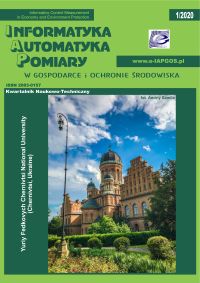PHOTODIODE BASED ON THE EPITAXIAL PHOSPHIDE GALLIUM WITH INCREASED SENSITIVITY AT A WAVELENGTH OF 254 nm
Article Sidebar
Issue Vol. 10 No. 1 (2020)
-
APPLICATION OF HURST INDICATOR TO CHOOSE AN ALGORITHM FOR RESOURCE CONTROL OF A TELECOMMUNICATION NETWORK
Anton Vrublevskiy, Ivan Lesovoy, Gennadij Pylypenko4-7
-
BLOCK CIPHERS ON THE BASIS OF REVERSIBLE CELLULAR AUTOMATA
Yuliya Tanasyuk, Petro Burdeinyi8-11
-
TIME INTERVAL SWITCHING DEVICE
Ruslan Politanskyi, Andrij Veryga12-15
-
ENVIRONMENT OF ELECTROMAGNETIC COMPATIBILITY OF RADIO-ELECTRONIC COMMUNICATION MEANS
Heorhii Rozorinov, Oleksandr Hres, Volodymyr Rusyn, Petro Shpatar16-19
-
THE GENERATING RANDOM SEQUENCES WITH THE INCREASED CRYPTOGRAPHIC STRENGTH
Volodymyr Korchynskyi, Vitalii Kildishev, Oleksandr Riabukha, Oleksandr Berdnikov20-23
-
THE INCREASE OF THE ENERGY EFFICIENCY OF THE RADIO EQUIPMENT BASED ON THE USE OF MODULATION BY ORTHOGONAL HARMONIC CARRIERS
Sergey Toliupa, Vladimir Nakonechnyi, Alexander Trush24-27
-
SYNTHESIS OF SAFE BEHAVIOR ALGORITHMS OF RADIOELECTRONIC SYSTEMS FOR CRITICAL APPLICATIONS
Leonid Ozirkovskyy, Bohdan Volochiy, Mykhailo Zmysnyi, Oleksandr Shkiliuk28-31
-
METHOD FOR ASSESSING THE STRUCTURAL RELIABILITY OF NETWORKS WITH UNDETERMINED TOPOLOGY
Nina Kniazieva, Alexey Nenov, Irina Kolumba32-35
-
PHOTODIODE BASED ON THE EPITAXIAL PHOSPHIDE GALLIUM WITH INCREASED SENSITIVITY AT A WAVELENGTH OF 254 nm
Yurii Dobrovolsky, Volodymyr M. Lipka, Volodymyr V. Strebezhev, Yurii O. Sorokatyi, Mykola O. Sorokatyi, Olga P. Andreeva36-39
-
DETERMINATION OF THE STRUCTURAL STATE AND STABILITY OF THE LASER CRYSTALLIZED Cd1-xМnxTe CRYSTAL SURFACE
Victor Strebezhev, Ivan Yuriychuk, Petro Fochuk, Sergiy Nichyi, Yuriy Dobrovolsky, Victoria Tkachuk, Mykola Sorokatyi, Yurii Sorokatyi40-43
-
TECHNOLOGY AND MEASUREMENTS OF MAGNETORESISTANCE IN THIN-LAYERED FERROMAGNETIC STRUCTURES
Jakub Kisała, Karolina Czarnacka, Mateusz Gęca, Andrzej Kociubiński44-47
-
STUDYING THE PROPERTIES OF PIXELS PERMUTATIONS BASED ON DISCRETIZED STANDARD MAP
Serhii Haliuk, Oleh Krulikovskyi, Vitalii Vlasenko48-51
-
FACE RECOGNITION TECHNIQUES
Olexandr N. Romanyuk, Sergey I. Vyatkin, Sergii V. Pavlov, Pavlo I. Mykhaylov, Roman Y. Chekhmestruk, Ivan V. Perun52-57
-
INVESTIGATION OF THE KOLMOGOROV-WIENER FILTER FOR CONTINUOUS FRACTAL PROCESSES ON THE BASIS OF THE CHEBYSHEV POLYNOMIALS OF THE FIRST KIND
Vyacheslav Gorev, Alexander Gusev, Valerii Korniienko58-61
-
MODELLING OF SPINTRONIC DEVICES FOR APPLICATION IN RANDOM ACCESS MEMORY
Ruslan Politanskyi, Maria Vistak, Andriy Veryga, Tetyana Ruda62-65
-
HARDWARE AND SOFTWARE MEANS FOR ELECTRONIC COMPONENTS AND SENSORS RESEARCH
Gryhoriy Barylo, Oksana Boyko, Ihor Gelzynskyy, Roman Holyaka, Zenon Hotra, Tetyana Marusenkova, Mykola Khilchuk, Magdalena Michalska66-71
-
WAYS TO PRODUCE RENEWABLE ENERGY FROM CARBON DIOXIDE
Natalia Grigorieva, Viktor Shabaykovich, Larysa Gumeniuk, Pavlo Humeniuk, Lubov Dobrovolska, Dmitry Sobchuk72-76
-
SATURATION OF THE ABSORPTION OF THERMAL RADIATION BY ATMOSPHERIC CARBON DIOXIDE
Jan Kubicki, Krzysztof Kopczyński, Jarosław Młyńczak77-81
-
CLASSIFICATION OF MULTIDIMENSIONAL POLARIZATION MICROSCOPY RESULTS IN THE TECHNOLOGY OF FORENSIC INTELLECTUAL MONITORING OF HEART DISEASES
Oleg Vanchulyak, Serhii Golub, Mariia Talakh, Vyacheslav Gantyuk82-86
Archives
-
Vol. 12 No. 4
2022-12-30 16
-
Vol. 12 No. 3
2022-09-30 15
-
Vol. 12 No. 2
2022-06-30 16
-
Vol. 12 No. 1
2022-03-31 9
-
Vol. 11 No. 4
2021-12-20 15
-
Vol. 11 No. 3
2021-09-30 10
-
Vol. 11 No. 2
2021-06-30 11
-
Vol. 11 No. 1
2021-03-31 14
-
Vol. 10 No. 4
2020-12-20 16
-
Vol. 10 No. 3
2020-09-30 22
-
Vol. 10 No. 2
2020-06-30 16
-
Vol. 10 No. 1
2020-03-30 19
-
Vol. 9 No. 4
2019-12-16 20
-
Vol. 9 No. 3
2019-09-26 20
-
Vol. 9 No. 2
2019-06-21 16
-
Vol. 9 No. 1
2019-03-03 13
-
Vol. 8 No. 4
2018-12-16 16
-
Vol. 8 No. 3
2018-09-25 16
-
Vol. 8 No. 2
2018-05-30 18
-
Vol. 8 No. 1
2018-02-28 18
Main Article Content
DOI
Authors
Abstract
The paper shows the results of the development of a photodiode technology based on gallium phosphide structure n+-n-GaP-Au with high sensitivity. It provides the ion etching of the surface of the gallium phosphide before an application of a leading electrode of gold. The barrier layer of a 20 nm thick gold is applied to the substrate in the magnetic field of GaP. When forming the contact with the reverse side of the indium substrate at 600°C, there occurs the annealing of the gold barrier layer. At the maximum of the spectral characteristics obtained by the photodiode, it has a sensitivity of 0.13 A/W, and at a wavelength of 254 nm – about 0.06 A/W. The dynamic range of the photodiode is not less than 107.
Keywords:
References
Anisimov I. D., Stafeev V. I.: Ultraviolet photodetectors based on wideband compounds. Applied physics 2/1999, 41–44.
Bix M. P., Dobrovolsky Y. G., Shabashkevich B.: UV Photodetectors based on gallium phosphide. Applied physics 4/2005, 97–100.
Dobrovolsky Y. G.: Photodiode, resistant to ambient lighting. Sensor Electronics and Microsystem Technologies 4/2006, 33–37.
Dobrovolsky Y. G., Pidkamin L., Prokhorov G.: Photodiodes on the basis of gallium phosphate with increased sensitivity at a wavelength of 254 nm. Proceedings SPIE 8338/2011, 83380N [http://doi.org/10.1117/12.920931]. DOI: https://doi.org/10.1117/12.920931
Dobrovolsky Y. G.: Based on GaP photodiode with high sensitivity in the short-wave UV region of the spectrum. TKEA 5/2012, 31–34.
Lamkin I. A., Menkovich E. A., Tarasov S. A.: Ultraviolet photodiodes based metal contacts – solid solutions of gallium nitride and aluminum. Scientific and technical statements STU. Physics and mathematics 3/2012, 28–31.
Malik A. I.: Optoelectronic properties of heteroijunctions metal oxide-gallium phosphide. Semiconductor Physics and Technology 25(10)/1991, 1891–1695.
Malik A. I., Seco A., Fortunator E., Martins R., Shabashkevich B., Piroszenko S.: A new high ultraviolet sensivity FTO-GaP Schottky photodiode fabricated by spray pyrolysis. Semicond. Sci. Technol. 13/1998, 102–107. DOI: https://doi.org/10.1088/0268-1242/13/1/016
Nicollian E. H., Brews J. R.: MOS (Metal Oxide Semiconductor) Physics and Technology. Wiley, New York 1982.
Sah C. T.: Fundamentals of solid-state electronics. World Scientific, 1991. DOI: https://doi.org/10.1142/1388
Sze S. M., Ng K. K.: Physics of Semiconductor Devices. 3rd Edition. John Wiley & Sons Inc., New Jersey 2006. DOI: https://doi.org/10.1002/0470068329
Article Details
Abstract views: 419
License

This work is licensed under a Creative Commons Attribution-ShareAlike 4.0 International License.






